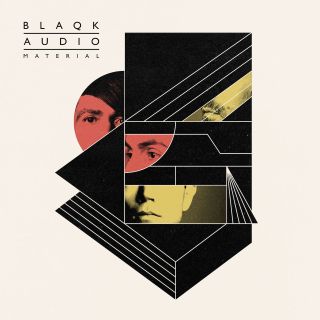One would not need to subject Blaqk Audio’s new album ‘Material’ to the same kind of analytical scrutiny afforded Beyoncé’s internet-melting ‘Lemonade’ album or Radiohead’s new track ‘Burn The Witch’ in order to draw the conclusion that frontman Davey Havok is currently in a dark place.
Contrasting with their bubbling, upbeat dance rhythms, tracks such as I’m A Mess, You Will Hate Me and To Be Alone are shot through with paranoia, regret, disenchantment and despair, while the slow-burning Black At The Center puts the lyric “I’m bound by pain, I can’t deny it” front and centre. Yet, while acknowledging that Material is “darker than our previous records”, today, speaking to TeamRock from his home in California, the 40-year-old singer sounds positively chirpy, as he looks ahead to what promises to be a busy year.
When AFI came off the road in November 2014 following a solid year touring their ninth studio album, Burials, Havok threw himself wholeheartedly into extracurricular activities. That same month he and Jade Puget, AFI’s guitarist since 1998, released the self-titled debut album by their excellent straight edge hardcore band XTRMST: the singer has also been working on his second book (the follow-up to 2013’s Pop Kids), and has found the time to write an album, not yet recorded, with a new band featuring No Doubt members Tom Dumont, Tony Kanal and Adrian Young. As he and his longtime friend and musical collaborator Puget prepare for the first Blaqk Audio tour in four years, the idea that he might be sitting around incapacitated by knots of self-loathing rather amuses him.
“I think there’s catharsis within all I create,” he muses, “and I think I’ve been reliant on that catharsis for most of my life. I’m really lucky to have that outlet in different forms of art. I’m a pretty private person, so there’s something deeply ironic that I choose to save my more personal moments for expression to the world.”
In an age when ‘celebrities’ feel duty bound to share the most intimate and personal details of their private lives, there’s something quite refreshing about Davey Havok’s self-possession. AFI may have emerged blinking from the underground (with 1999’s Black Sails In The Sunset and 2000’s The Art Of Drowning) at the same time as nu-metal became rock music’s dominant strand, but where the likes of Fred Durst, Jonathan Davis and Corey Taylor routinely ripped out their bloodied, bruised hearts for forensic examination, the New York-born David Paden Marchand retained a mystique and dignity wilfully out of step with the times. Ask the singer if he thinks that people know the ‘real’ Davey Havok, and the question is met with a wry chuckle.
“Seemingly not!” he replies. “Throughout my life I’ve come to realise that there are so many different perceptions of who I am, and misconceptions. But I feel that’s based on people’s interpretations of my art, and I think that’s great. I’m not out to tell people what to take from my music, an individual will generally take what they need from it. If they need me to be one thing or other to connect with it, and that’s what they’re going to decide, whether or not it’s accurate, then fair enough. But it’s interesting for me to hear certain perceptions when they can be so far off… and even more interesting when they’re actually right, and have some accurate insight into who I am.”
AFI might have flirted with the mainstream in their 25 year career – 2006’s Decemberunderground album actually debuted at number 1 on the Billboard album chart in the US – but the Californian act have retained a cult appeal, and accumulated a loyal fan-base who appear more open-minded and less fickle than that garnered by many of their peers. Put it to Havok that AFI fans are extremely tolerant of his various creative explorations outside the band, and the singer bristles slightly and offers a correction, saying “it’s not just tolerance, it’s more like appreciation and support.”
“I think the core AFI fans really enjoy what we create as AFI, but also look forward to seeing what we can create as individuals,” he says. “Whenever I’m in a venue performing or presenting something that I’ve created outside of AFI I always find that there’s a large number of ‘fans’, if you will, that came there by way of AFI.”

Conversely then, are there also Blaqk Audio fans that don’t know, or maybe don’t care for, your rock side?
“Absolutely,” he says. “I’ve met them on numerous occasions. It’s a tribute to their open-minded nature that some music fans will have no interest in our rock side still take the time to check out Blaqk Audio. That means a lot to me.”
In 2016, and indeed arguably for the past 20 years, mainstream cultural commentators have been fond of repeating the idea that rock music is in a kind of stasis whereas the EDM scene is more creative, vibrant and vital. As much as Blaqk Audio owe a debt aesthetically and sonically to artists such as Depeche Mode, New Order, Pet Shop Boys and the grimier industrial sounds of Skinny Puppy, Nitzer Ebb and Ministry, as someone with a sneaker in each camp, Havok is cautious about accepting this viewpoint as an ingrained truth.
“I think it cannot be denied that the burgeoning electronica scene is offering so much creativity and so much great art,” he says, “but just because that’s the case doesn’t mean that there’s not a lot of great rock music being created as well. At this point in culture, dance music is definitely getting the spotlight, but these things go in cycles as we all know, and I think it’s very possible at any moment for a young rock band to write something which impacts people in such a way that, all of a sudden, the mainstream turns back to rock. Regardless of what the mainstream focuses on, there’s constantly great creations happening outside the margins.”
Suggest to Havok that perhaps Blaqk Audio, and indeed XTRMST, might offer something of a ‘release valve’ for Puget and himself in terms of these projects existing outside of the mainstream, and consequently being less pressurised than AFI, and the singer considers the question carefully, before answering “Hmmm, not really, because I mean pressure doesn’t come externally, it’s internal. I always want whatever art I put out to be worth standing behind.”
“Jade and I have worked for so many years together, and we’ve been friends for so long, and the work he creates is so inspiring, so it’s always exciting for me to work on new music with him, no matter what the genre.”
Blaqk Audio’s forthcoming US tour begins today in San Diego and runs through to June 4, with a festival performance at the Shoreline Amphitheater at which the duo will appear alongside Bad Religion, Silversun Pickups and their former mentors The Offspring, whose frontman Dexter Holland signed AFI to his Nitro label back in the mid ‘90s. Curiously, given their sound, there appears to be no appetite among EDM promoters to book the band for summer festival dates, which rather bemuses Havok, though he accepts that Blaqk Audio’s more ‘traditional’ songwriting approach isn’t necessarily in vogue on the scene’s cutting edge. Whatever, Havok says that he and Puget are “beyond excited” about bringing their project to the people anew. Asked if the pair have a deadline to get back to AFI business, the singer says “No, it’s pretty fluid.”
“If we got a call, for instance, that someone wanted us to play a show in London we could definitely make that happen whenever,” he says.
So should promoters in the UK consider that a ‘come and get us’ plea from Blaqk Audio?
“Absolutely,” Havok laughs. “We would love to play in England, because England has always been such a special place for us. Please don’t consider it a snub that we haven’t been there yet with Blaqk Audio. And, hey, if you’re reading this promoters, you know where to find us…”
Blaqk Audio’s album Material is out now. For more information on the band, visit their official website.


